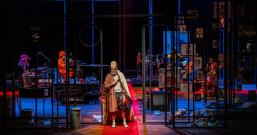Supporta Gothic Network
Den Haag. The Mad King, locking up insanity
I decided to write this article in English first to get back to my traditional favourite language, secondly, because I would like to give to what I tell a wider spread, as I'm speaking also of an argument mostly commented in the English language as a mediator reaching the broadest audience and gathering the widest open range of views, peer reviewed. We present The Mad King in the production of OPERA2DAY in Den Haag and the New European Ensemble, together with Stefano Simone Pintor as director, and Hernán Schvartzman as conductor. The main role of The Mad King is played by the tremendous bariton Charles Johnston.
22 January, in Den Haag, a particular pantomime, a mixture of unbelievable music and theatre alike, converted into The Royal Theatre facing a void audience. Lockdown, here and out, flows as an imperfect western way of reacting to “The Virus”, because never, in history, another virus has locked down and blocked every breath of western art and democracy to spread around the world, eastern and western.
The pièce is called The Mad King and makes reference to the historical mad king of England George III, who reigned from 1760 to 1820 over Great Britain and Ireland, whose major and passionate hobby was painting birds, and even in a delightful way he crowned his keen devotion.
The “Eight Songs for a Mad King.”, Peter Maxwell Davies's score, aims to paint the tapestry of a loop between fragments of Renaissance music interluded by dodecaphony streams, well reporting the boundless attempts of the king in teaching how to sing to his beloved birds.
It's a weird effect to follow a crowned man doubly locked up: into his insanity, into this room surrounded by cages, another symbol of enclosure. It seems the real jail is not intended for sanity, but properly led to madness, the only communication left is that with his birds, as the new entry is a sort of anthropomorphic bird who rules him in terms of fear and authority.
Georg Friedrich Händel, Brendan Faegre, counterparts the flux written by Davies, relieving the audience from the twisting downfall into madness, so conductor Hernán Schvartzman directs his small orchestra towards an harmonical sound which soon sweep into the forest of a piercing chaos.
Sprechgesang feeds everything with a fainting sensation of Apocalypse and we imagine, or someone hopes, an Angel Gabriel of a new world to come will reveal his hidden agenda, letting a different spring to come evermore. Maybe that was already planned and sang by the birds, who, migrating, hear unrecognizable sounds for the human beings.
From time to time, to my memory, failing to surprise, comes to mind what Aldous Huxley was reminding us for the future through his visions of Heaven and Hell (sequel to The Doors of Perception, 1956): Huxley derived the title from William Blake 's book The Marriage of Heaven and Hell (1793):
“In Sartor Resartus Carlyle has left what (in Mr Carlyle, my Patient) his psychosomatic biographer, Dr James Halliday, calls 'an amazing description of a psychotic state of mind, largely depressive, but partly schizophrenic".”
Appendix VIII
That perfectly fits the description of The Mad King, but I think that, the continuous, unspeakable, oppressive enclosure has produced also something else, and quite more frightening, again from Huxley/Carlyle:
'The men and women around me,' writes Carlyle, 'even speaking with me, were but Figures; I had
practically forgotten that they were alive, that they were not merely automata. (….) To me the Universe was all void of Life, of Purpose, of Volition, even of Hostility; it was one huge, dead immeasurable steam-engine, rolling on in its dead indifference, to grind me limb from limb.. .. Having nohope, neither had I any definite fear, were it of Man or of Devil. And yet, strangely enough, I lived in a continual, indefinite, pining fear, tremulous, pusillanimous, apprehensive of I knew not what; it seemed as if all things in the Heavens above and the Earth beneath, would hurt me; as if the Heavens and the Earth were but the boundless jaws of a devouring Monster, wherein I, palpitating, waited to be devoured.'
Renee and the idolater of heroes are evidently describing the same experience. Infinity is apprehended by both, but in the form of 'the System', the 'immeasurable Steam-Engine'. To both, again, all is significant, but negatively significant, so that every event is utterly pointless, every object intensely unreal, every self-styled human being a clockwork dummy,
143
grotesquely going through the motions of work and play, of loving, hating, thinking, of being eloquent, heroic, saintly, what you will - the robots are nothing if not versatile.”
This points out what we have lost through this age, which seems not to be only a period of time, but something we have to resist to, as humans, cuddling again the roots of our culture, enclosed into ourselves and common, nonetheless embraceable, to everyone.







